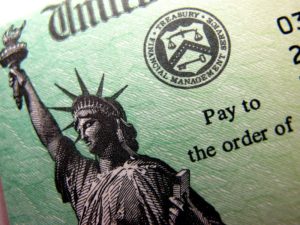
Thanks to Republicans, stimulus checks are cut in half and come very late
At long last, Congress is has passed a $900 billion follow-up COVID relief bill. The last such legislation, the CARES Act, was passed and signed into law in March, and totaled $2.2 trillion. The CARES Act featured, among other things, “stimulus” payments to many individuals of up to $1200, loans to “small” businesses (with up to 500 employees), and additional unemployment benefits for three months. By mid-May, House Democrats had already passed a follow-up bill, the HEROES Act, often referred to as a “second stimulus,” to provide more assistance as the initial CARES Act relief was running out for almost everyone. However, as with most House legislation, the HEROES Act has languished on Republican U.S. Senate Majority Leader Mitch McConnell‘s desk all this time.
Finally and very late, McConnell and Republican Senators have decided to move forward with new COVID relief legislation. The agreement between Democrats and Republicans provides for the following:
–direct “stimulus” payment checks of up to $600 per adult and child
–further loans to small businesses
–$300 per week in extra unemployment benefits
–mere one-month extension on eviction moratorium
–funding for COVID vaccine distribution, testing contact tracing
–expanded tax deductibility for business meals, a/k/a the “Three Martini Lunch” provision, sought by Donald Trump and Republicans
What did not make it into the legislation were some things sought by Republicans, such as widespread corporate immunity from legal liability, and some things sought by Democrats, such as a larger ($1200) direct stimulus payment, and aid to state and local governments to offset things like lost tax revenues due to decreased tourism. But note the difference in which party sought what.


